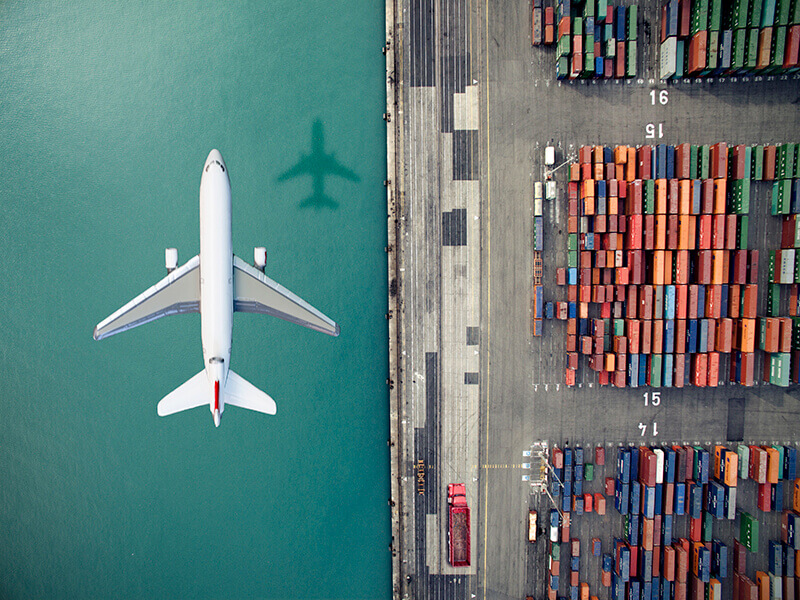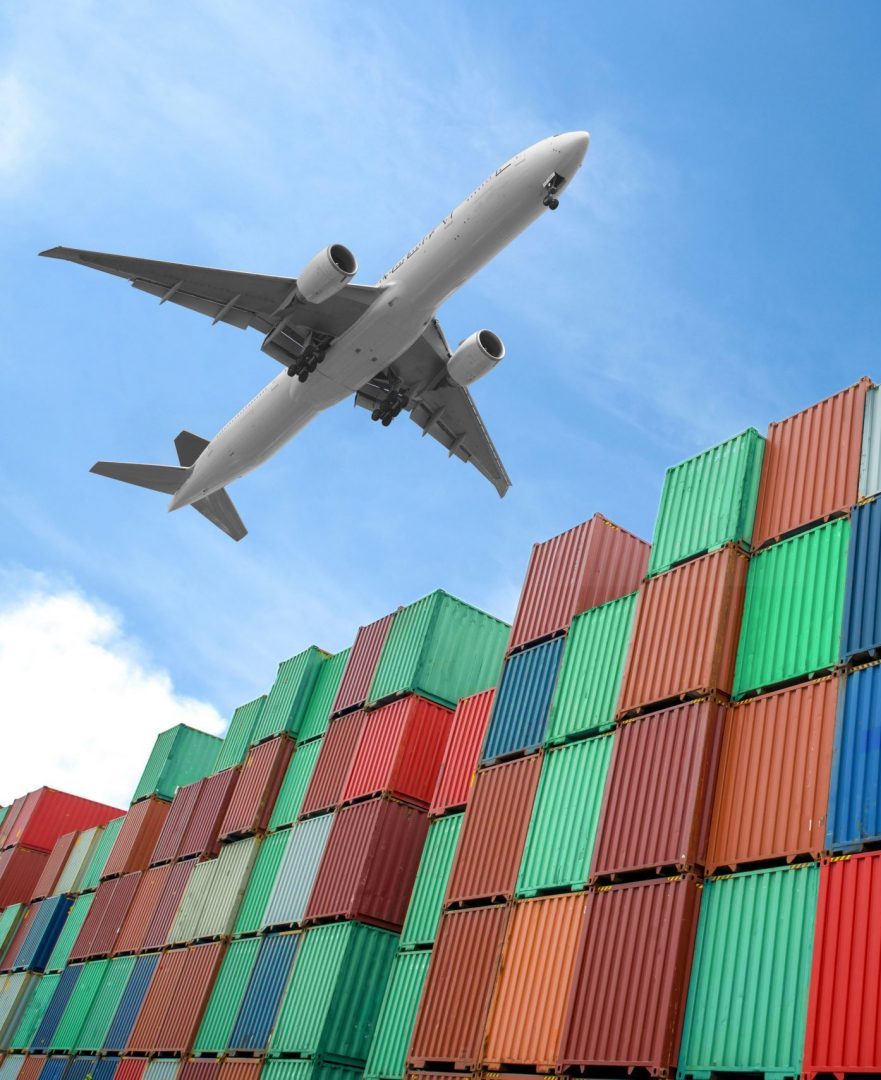
Air Cargo Insurance
Insurance for air cargo protects businesses and individuals from a variety of financial risks should goods be lost, damaged, or stolen during transport by air. Since international US.shipping is so complex, insurance is a key component in safeguarding expensive shipments so that sudden incidents do not lead to large monetary losses.
Key Features of International Air Cargo Insurance: The scope of coverage, the nature of risk, the pricing, and the claims procedure are the four important features that distinguish International Air Cargo insurance. Coverage Scope:
All-Risk coverage: Most risks are generally covered under this category, including damage, loss, and theft when the cargo is in transit.
1. Named Perils: A policy covering only named perils such as fire, natural disasters, or accidents without general mishandling or theft. Warehouse-to-Warehouse Coverage: It extends from the seller's warehouse to the buyer's warehouse, and includes loading and unloading and temporary storage.

2. Risk Factors :
o Weather-related damage: Air cargo is prone to delays and damages due to storms, turbulence, or temperature changes.
o Theft and pilferage: Despite strict security at airports, there is still theft when it involves handling and transfer.
o Accidental damage: Poor handling of cargo either at loading or unloading can lead to huge losses.
3. Who needs it:
o Exporters/importers: Firms which export/import goods, especially those bearing high value.
o Logistics: Freight forwarders or firms who are concerned with the physical movement of goods.
o E-commerce businesses: U.S Businesses concerned with cross-border sales of goods.
4. Exclusions:
o Improper packing: Claims may be denied if the goods are not packed in accordance with the standards in the industry.
o Delay: Most policies do not cover delays that do not result in physical damage.
o Listed Exclusions: Inherent vice, for example, spoilage of food because of its inherent nature or character is normally excluded.
5. Computation of Premium:
o Based upon the value of the goods, their destination, nature of goods to be transported, and distance to be traveled.
Advantages of International Air Cargo Insurance
• Face USA Financial Protection: It compensates against losses and/ or destruction of cargo and therefore saves the shipper/ owner from facing devastating losses.
• Peace of mind: Assures businesses their goods are covered and minimizes the pressure from knowing that goods may be lost while shipping internationally.
• Increase in customer confidence: Definitely, being in a position to offer insured shipments increases the credibility for customers of a company.
International air cargo insurance is just not a necessity but also highly vital for all operators in international trade. Considering the various risks associated with air carriage, this type of insurance can enable a business to limit potential financial losses whenever operating abroad.
Benefits of International Air Cargo Insurance
The international air cargo insurance policy brings a number of benefits in business and to the people involved in international trade. Presented herein are the main advantages associated with taking such ins urance policies:
urance policies:
1. Full Coverage Against Loss or Damage
• Coverage against Fortuitous Events: It covers a wide range of risks from theft, damage, loss, accidents, and natural disasters. This provides assurance that cargo is well-protected during transportation.
• All-risk policies: Most insurance companies provide "all-risk" policies, covering almost every risk except a few which are excluded, hence offering wide peace of mind.
2. Reduces U.S Financial Loss
• Compensation for loss or damage: In case any accident or event takes place during the course of transit and results in loss or damage to the goods, huge financial loss may occur to a company without insurance. Cargo insurance covers the actual value of goods and, on occasions of accidents, provides financial compensation.
• It reduces liability exposure: International conventions might limit the liability of the shipper or freight forwarder, while the compensation by carriers may not be enough to cover losses. Compensation against air cargo insurance bridges the gap by offering full compensation against the declared value of the cargo.
3. Mitigating Business Risks
• Avoids disruption of business processes: Insurance safeguards one's firm from financial paralyzing effects when shipping goes awry. USA Businesses can easily stand up and recover from these mishaps without bearing unexpected costs.
• Smooth cash flow: In-transit-loss insurance allows businesses to maintain the smooth circulation of cash even in incidences of U.S shipping disasters.
4. Cover can be tailored
• Customized U.S policies: Air cargo insurance policies are available as customized policies, with regard to the particular requirements of the shipment. Companies are allowed to cover their goods against loss, considering the value, nature, and risk factors associated with it.
• Warehouse-to-warehouse coverage: Most of them provide end-to-end protection right from taking the goods from the house to the delivery stage, even covering storage and handling.

5. Facilitates Global Trade
• Confidence in International US Shipments: Air cargo insurance is a facilitator of smoother international transactions as it increases confidence in not being apprehensive about cross-border shipment risks. Shippers, importers, and exporters will have little problem engaging in world trade, knowing that their goods are covered.
• Encouragement of High-Value Shipments: Companies shipping high-value or fragile merchandise are comfortable shipping internationally, confident in knowing that they are insured in case of loss.
6. Improved Customer Confidence and Satisfaction
• Building reliability: Companies offering insured shipments show customers that they value product protection. This inherently builds trust and could lead to repeated business.
• Customer Assurance: When the client is assured of compensation in case of loss or damage, the overall satisfaction of the transaction is most likely increased.
7. Smooth Claiming Process
• b. Quick Compensation: Several insurance providers often have a very efficient claims process such that businesses do not experience extremely long delays in compensation.
Insurance companies may also provide professional assistance in claiming insurance, preparation of documents, and dealings with different international laws and regulations, which are generally complex.
8. Protection against Carrier Limitations
• Provides coverage to overcome carrier liability limits; airlines generally have limited liability under the international conventions like the Warsaw and Montreal Conventions. This simply means that compensation received from the carrier may not be adequate enough as the full value of the shipment. Air cargo insurance, therefore, ensures businesses receive the full value of their goods regardless of the limitations.
• Reduced stress: When goods are covered from the time they were shipped up to the time they actually arrive at one's doorstep, businesses can focus more on operations than the risks during transit.
International air cargo insurance provides protection, financial-structural security, and confidence to business people in international trade. It reduces the risks and uncertainties in sending goods by air,-smoothening the operations, winning better confidence from customers, and better handling of any loss by companies.
Shortcomings of International Air Cargo Insurance
Although international air cargo insurance has several advantages, the disadvantages of international air cargo insurance are there and must be seriously considered by any business. Key disadvantages will include:
1. Added Expense • Enhanced Expenses: Purchasing air cargo insurance increases the overall shipment cost. In companies that deal with great volumes of goods or high frequencies of shipment, the cost may add up, therefore shrinking the profit margins.
• High-risk item premiums: Shipment of high-value, fragile, or hazardous materials may be charged higher premiums, hence to a great extent affecting shipping budgets.
2. Exclusions and Limitations
• Not all risks are covered: Most air cargo insurance policies contain exclusions. In general, the damage caused by improper packaging, war, terrorism, or inherent defects in the goods-for example, when some goods such as perishables go bad-are normally not covered.
• Limited coverage in certain situations: A standard policy, per se, does not cover losses on ground transportation, handling, or periods of temporary storage, except when warehouse-to-warehouse coverage is afforded. This leaves parts of the shipment vulnerable.
3. Complex Claims Process
• Time-consuming documentation: In case of a loss or damage, filing often requires substantial paperwork with proof of the incident involved, which may be time-consuming and bureaucratic.
• Delayed compensation: The claims process, depending on the insurer involved, can sometimes take longer than anticipated and thus affects business through a disruption in cash flow when there is delayed compensation.
4. Overlapping Coverage
• Carrier-provided insurance: Most air carriers have some form of limited liability insurance on cargo they transport. If a business buys air cargo insurance separately, then it may be paying for redundant coverage - on top of what the carrier provides.
•InRange of Self-insurance: Large companies may have insurance mechanisms or reserves internally for managing shipping risks, thus requiring no external insurance in that respect.
5. Premiums Based on Factors of Risk
• Higher premiums for certain regions or goods: If goods are being shipped to high-risk areas-for example, conflict zones, regions with poor infrastructure-the U.S cost of insurance goes really high. Similarly, shipping fragile, high-value, or hazardous goods may lead to considerably higher premiums.
• Higher premiums for small businesses may exist; the larger ones invariably receive significant discounts in view of the large number of items they send, while small businesses pay an inordinately high premium.
6. Limited Amount Recoverable
• Declared value issues: A loss is usually compensated based on the value declared for the goods. Whenever this value has been underestimated to reduce insurance premium, the compensation to the business could be lower than the value of the goods.
• Depreciation and replacement cost disparities: Some policies could pay on a depreciated value of goods, not based on replacement cost. This can leave a shortfall for businesses replacing items lost or damaged.
7. False Sense of Security
• Complacency Risk: Firms would become so confident in air cargo insurance that they will be more careless in sending out their products, such as taking shortcuts in packaging, routing, or selecting a certain carrier. Where insurance covers, best practices are not substituted.
• Complexity in policy understanding: When businesses buy insurance, they may wrongly assume that all the risks are insured, while there might be exclusion of premium in respect of certain eventualities such as delays or packaging failure.
8. Variability in Premium Amounts
• U.S Market and risk variability: The cost of air cargo insurance fluctuates according to the general world U.S market, geopolitical risks, and even frequency of incidents occurring during air travel. These fluctuations make it difficult for a business to project its shipping cost in the long run.
• Frequent adjustments: Since the history of claims may form a basis for adjustment, insurance companies often do this frequently. Hence, unexpected rises in insurance cost may be experienced by U.S businesspeople who have been booking more claims.
Air Cargo Insurance Policy
An international air cargo insurance policy is one that covers goods being transported by air against damage, theft, or any other loss during transit. It has specific terms, conditions, and exclusions defining the coverage.
Below is a broad view of what to expect from most policies:
1. Scope of Coverage
• All-Risk Coverage: This is the most comprehensive type of insurance USA policy, which provides coverage against all kinds of physical loss or damage to the cargo, except for those specifically excluded by the policy. • Named Perils Coverage: Covers only those risks or perils which are explicitly named in the policy, which could be fire, lightning, or accidents involving the aircraft carrying the shipment. It is narrower than all-risk coverage.
• Warehouse-to-Warehouse Coverage: Allows protection beyond air transit to the journey from the originating warehouse to the final destination warehouse, including loading and unloading.
2. Types of Risks Insured
• Physical loss or damage: Damages caused by accident, mismanagement, natural calamity, or error committed by someone.
• Theft and pilferage: Theft or tampering with the U.S shipment in transit or at airports while being handled.
• General average: A marine principle applicable to air cargo insurance in rare instances where part of cargo has to be sacrificed to save the aircraft. All consignors share the loss proportionately but the loss is covered by insurance.
3. U.S Policy Exclusions
• Improper packing: Goods not packed as per industry standards and that get damaged as a result are usually excluded from cover.
• Damage due to inherent vice is not covered: This defines the damage that develops from the natural properties of the goods-spoiling of the perishables, rusting of metals, and so on.
• Delayed delivery: These are usually excluded, meaning business interruptions or lost contracts are normally not compensated for, unless and until such delays actually cause physical damage.
• Exclusions can be made for war and terrorism-a loss resulting from an act of war, terrorism, or political instability. Though it is possible to buy additional coverage in these cases.
• Customs issues: Seized or delayed cargo due to customs regulations may not be compensated, unless a clause in the policy covers it.
4. Policy Duration
• The period of coverage the transit time: The insurance is considered effective when the goods are outside the premises at the commencement of transit up to delivery to the final destination. This may also involve temporary storage or delays during transportation, subject to the terms.
• Termination clause: In such cases, a US.policy might specify that coverage is terminated upon the delivery of goods at the destination, or on completion of a certain number of days in temporary storage.
Posted on 2024/10/17 09:22 AM
